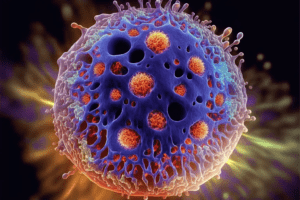What are exosomes?
Exosomes are small extracellular phospholipid bilayer vesicles. They play essential role in communications between cells. Exosomes is an emerging therapy for the patients with hair loss.

Why exosomes are studied for hair loss?
The cycle of the hair consists of growing anagen phase, transitional phase called catagen and end of life phase (hair falling) called telogen. The growing anagen stage is governed by interactions between hair follicle stem cells (HFSCs) and dermal papilla cells (DPCs). Since exosomes are responsible for communications between cells, a better understanding of the mechanisms responsible for hair growth and hair cycling through exosomes may provide new insights into novel treatments for hair loss.
Which exosomes are used in hair loss?
Dermal papilla cells (DPCs) are widely used in hair growth studies. DPCs cells are mesenchymal cells with stem cell properties. They have ability to regulate hair follicle development through interaction with epithelial cells. This plays essential role in hair growth. DPCs function as a paracrine regulator of hair follicle stem cells (HFSCs).
According to clinical studies, DPC-Exos induced human hair follicle growth. Study demonstrated hair growth effects including the acceleration of the hair transition into growing anlagen stage, potentially through the upregulation of fibroblast growth factor and β-catenin pathways.
Adipose-derived stem cells (ADSCs) also observed to increase hair growth and dermis thickness as per clinical studies.
Exosomes in Androgenetic alopecia (AGA) and other types of Alopecia.
Exosomes are used and studies on non-cicatricial (non-scarring) Alopecia. Most of the studies are conducted on patient with Male Pattern Hair Loss and Female Pattern Hair Loss, and some on Alopecia Areata.
Androgenetic alopecia (AGA) is the most common cause of genetic progressive hair loss in men. Male hair loss has a profound negative impact on mental health of the patients, on physical appearance and on quality of life in general. AGA affects 67 % of men and about 23 % of women.
Treatment with exosomes have shown favourable results in both men and women.
Safety of exosomes.
At present there are no clear standards on quality of exosomes production. There is a need for further improvement in formulation, regimen, and delivery methods.

